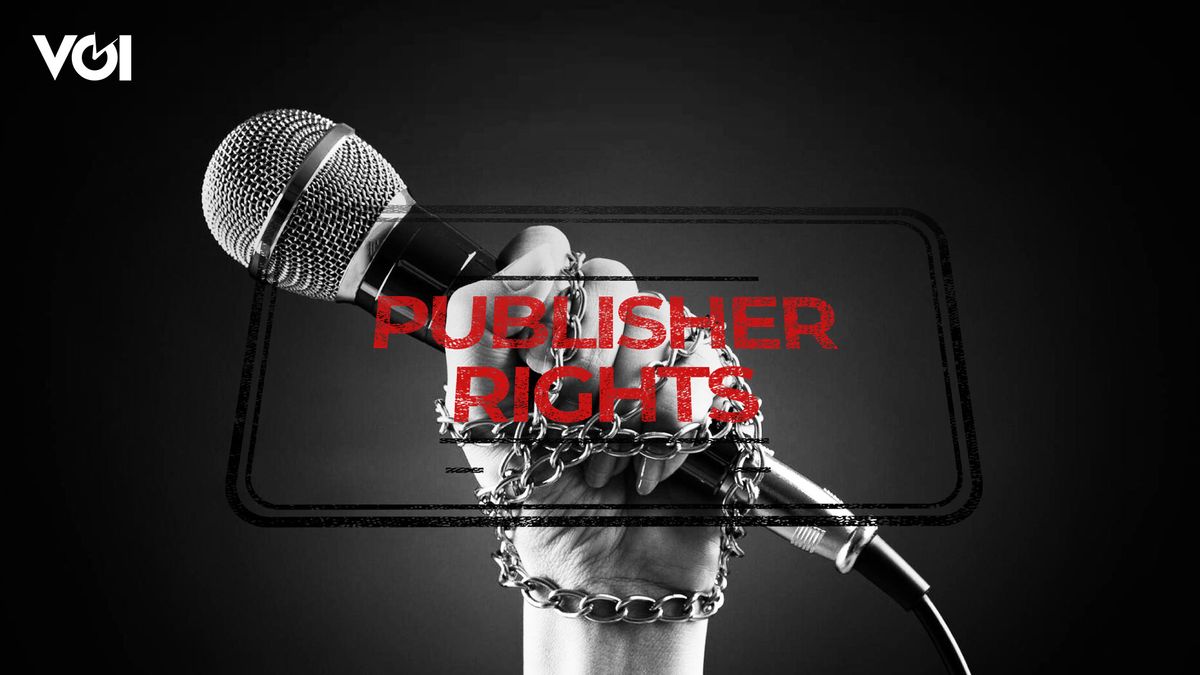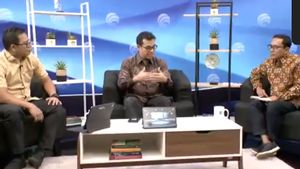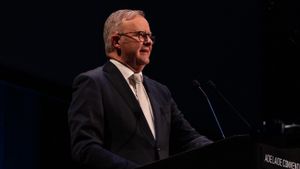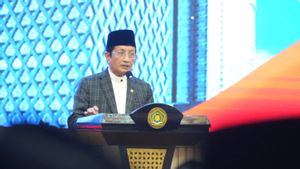JAKARTA The peak of commemorating National Press Day, Tuesday 20 February 2024 may be a historic record for the world of press or media in Indonesia. The reason is, President Joko Widodo ratified Presidential Regulation (Perpres) Number 32 of 2024 concerning Publisher Rights.
Publisher Rights is a rule that requires internet companies such as Google to Meta (Facebook, Instagram, and WhatsApp) to negotiate commercial deals and pay Indonesian mass media for news content that airs on its platform.
The birth of Presidential Decree 32/2024 is expected to be able to support the sustainability of the national media industry, as well as fairer cooperation between press companies and digital platforms with a clear legal framework.
Because, when the rules apply, digital platforms can no longer freely take news from the media. In other words, media can sue internet companies that use their content to share profits, for example with Google, Facebook, to TikTok.
This Publisher Rights rule is actually not new in the world of the mass media industry. Before in the country, this security rule was also implemented in several countries such as Australia, Canada and France. In Australia, this rule is known as the News Media Bargaining Code.
As reported by Media Freedom Coalition, the Australian Government began working on the News Media Bargaining Code by requesting input and recommendations from the Australian Consumer Competition and Protection Supervisory Commission (ACCC) in April 2020. This rule then took effect in March 2021.
After taking effect, Google and Meta agreed on a voluntary commercial agreement with a large number of news media in Australia. The ACC, among other things, gave permission to Country Press Australia on August 5, 2021, and Commercial Radio Australia on October 29, 2021, to bid with Google and Facebook on the benefits of news content displayed on the platform, without violating Australia's business competition laws.
ACCC assesses that the implementation of the policy has been successful to date. Because more than 30 commercial agreements between digital platforms (Google and Meta) and various news businesses in Australia have been reached. Not only large media, small media also benefited from the New News Media Bargaining Code rules. From the ACC data, economic value agreements range from 3 to 5 years of contract, with a profit value of more than 200 million Australian dollars.
VOIR éGALEMENT:
One of the shortcomings of implementing this rule is the limited profit for small to medium media. According to ACCC, Google and Meta are easier to make agreements with major media companies in Australia, such as News Corp Australia, Nine-Fairfax, ABC, and Seven. Usually, these media can sign agreements more quickly. One solution, small and medium media must first form a joint association before notice and achieve negotiations with Google and Meta.
In addition, media in Australia have not yet received details of agreements with digital platforms. Because this rule does not require the disclosure of details of any agreement and this is protected by a confidentiality agreement (NDA). Thus, it will be difficult for the media to know the details of the profits and how to take a negotiation approach. Regardless, the implementation of the News Media Bargaining Code is considered to bring bright hope for the sustainability of the media in Australia.
It's different from Canada. Quoted from Reuters, Google had an objection to the Publisher Rights rules called the Online News Act/Bill C-18 which took effect in June 2023. This regulation in Canada is considered stricter than the implementation of Publisher Rights in Australia and Europe.
Google argues that showing news should be done by all parties for free on the internet, so there is no need to pay to the publisher. However, in the end Google agreed to comply with Canada's Bill C-18 rules to cancel blocking Canadian news.
The agreement on Google to comply with Bill C-18 rules is allegedly due to successful negotiations on the amount of payments for local media or news publishers. This has also been confirmed by Canada's Minister of Cultural Heritage, Pascale St-Onge.
"After a tough discussion for weeks, I am pleased to announce that we have found a middle ground with Google for the implementation of the Online News Act," he said.
According to a Canadian official, Google agreed to pay around $100 million annually to media in Canada. Apart from Google, Meta should also follow the Online News Act if it still wants to broadcast Canadian news on their platform. However, a Meta spokesperson said that it would continue to block Canadian news even though Google had changed its mind.
In Europe, France is said to be the first country in the European Union to implement Publisher Rights rules. Neighboring Rights rules have been in effect since July 2019. Google later signed an agreement to pay French media for the right to display their news content online since the rules took effect. Thus, media organizations in France will be compensated fairly when their news article appears on the pages of search engines.
However, this agreement does not always run smoothly. Disputes over Neighboring Rights have exacerbated relations between Google and French news organizations. Google was even fined 500 million euros over copyright disputes with news publishers.
What about in Indonesia later? After being signed by President Jokowi, last Tuesday, February 20, Publisher Rights will take effect after 6 months from the date of promulgation. Some of the points in Presidential Decree 32/2024 include First, not facilitating the spread and/or not commercializing news content that is not in accordance with the law regarding the press after receiving reports through reporting facilities provided by digital platform companies.
Second, provide the best efforts to help prioritize facilitation and commercialization of news produced by press companies. "Provide fair treatment to all press companies in offering digital platform services," reads Article 5 letter c.
Fourth, implement training and programs aimed at supporting quality and responsible journalism. Fifth, provide the best efforts in designing news distribution algorithms that support the realization of quality journalism in accordance with democratic values, diversity, and laws and regulations. Finally, working with a press company.
Intermediate solidarity
Sustainability media observer, Agus Sulistyo, revealed that media in the country, especially small and medium media, need to pay close attention to the implementation of Publisher Rights in Australia. According to him, one of the keys to the success of Publisher Rights in Indonesia is intermediate solidity and the opportunity to negotiate collectively.
"Collective negotiation options need to be fought for by the Government and the Press Council to protect the interests of small media or regional media," he added.
He explained, simply put, the relationship between a publisher and a digital platform is the relationship between the content owner and the content distribution technology owner. The compound between content and content distribution technology in practice gives birth to benefits: traffic, popularity, leverage of ad revenue and user data.
In this context, continued Agus, Publisher Rights institutions negotiations between the two parties. In this negotiation, each party can argue about each other's contributions to the above charges. Due to the position and strength of the technology owner who is very dominant, it is possible for the content owner to negotiate collectively.
He stated that the implementation of Publisher Rights is a panacea that will cure all diseases of national media lifepower. Because, Publisher Rights is very important to provide public bargaining power in dealing with digital platforms that have monopolized the distribution of digital content and advertising spending.
"But, the publisher must also continuously innovate to find new forms of content distribution, public interaction and content monetization. The mass media must continue to adapt to changes in the ecology of media consumption," said Agus.
Through a written statement Thursday, February 22, 2024, Director of Public Policy for Southeast Asia's Meta Regional, Rafael Frankel stated that his party had consulted several policy makers regarding the rules of Publisher Rights.
We understand that Meta will not be required to pay for news content posted by news publishers voluntarily to our platform. We appreciate the progress policy makers have made in ensuring that Presidential Regulation Publisher Rights recognizes the benefits of news publishers in the services we provide," he said.
Meanwhile, Google in a written statement, Wednesday, February 21 stated that it understands the government's decision to ratify the Presidential Regulation Publisher Rights and will soon understand the details. Google also claims that it has been working with news publishers and the government to support and build the future of a sustainable news ecosystem in Indonesia.
"So in this joint effort, we always emphasize the need to ensure that Indonesians have access to diverse news sources, and also the need to strive for a balanced news ecosystem in Indonesia, namely, an ecosystem that can produce quality news for everyone, as well as enable all news publishers, both big and small, to develop," said a statement from Google representatives.
The English, Chinese, Japanese, Arabic, and French versions are automatically generated by the AI. So there may still be inaccuracies in translating, please always see Indonesian as our main language. (system supported by DigitalSiber.id)












